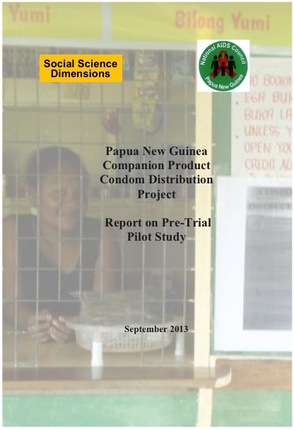
Announcing the release of the report on the Pre-Trial Pilot Study for the Papua New Guinea (PNG) Companion Product Condom Distribution (CPCD) project. Prepared by Social Science Dimensions with support from the PNG National AIDS Council Secretariat and in collaboration with a private sector partner active in the PNG market place, the report outlines the results of preliminary research into the CPCD approach conducted in the provinces of Milne Bay and Simbu during the first half of 2013.
Extract from the Introduction as follows: The study is a preliminary analysis based on a small data set of 100 storeowners, consisting of 25 storeowners randomly selected from within each of four LLGs from the two selected provinces. The survey methodology involved a two-stage interview process. During the initial interviews, storeowners agreeing to participate in the study were each given 200 condoms to either sell or give away in accordance with their own preference. A second interview, undertaken on average 15 days after the first, sought information from storeowners on how many of the condoms had been distributed, and whether these had been sold or given away.
As discussed in Section 2 of this report, the time-span of only 15 days (average) between the first and second interviews is a limitation of the study, as a longer time-span could present greater opportunity for the emergence of opposition to the CPCD approach. Whereas it is intended that a larger data set be generated in the course of the live trial currently being organized, and that this live trial span a greater period of time, the preliminary data outlined in this report offers some encouraging insights into the potential of the CPCD approach in the PNG context...
To download the report, click on the link below.
Extract from the Introduction as follows: The study is a preliminary analysis based on a small data set of 100 storeowners, consisting of 25 storeowners randomly selected from within each of four LLGs from the two selected provinces. The survey methodology involved a two-stage interview process. During the initial interviews, storeowners agreeing to participate in the study were each given 200 condoms to either sell or give away in accordance with their own preference. A second interview, undertaken on average 15 days after the first, sought information from storeowners on how many of the condoms had been distributed, and whether these had been sold or given away.
As discussed in Section 2 of this report, the time-span of only 15 days (average) between the first and second interviews is a limitation of the study, as a longer time-span could present greater opportunity for the emergence of opposition to the CPCD approach. Whereas it is intended that a larger data set be generated in the course of the live trial currently being organized, and that this live trial span a greater period of time, the preliminary data outlined in this report offers some encouraging insights into the potential of the CPCD approach in the PNG context...
To download the report, click on the link below.
| cpcdp_stage_1_report[final].pdf |

